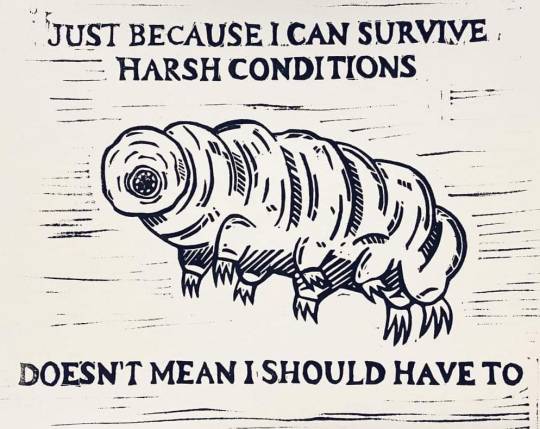✽ Dissociation & Trauma Recovery Blog ✽ Hello, I am Sunflower. I am recovering from dissociative identity disorder (DID) & posttraumatic stress disorder (PTSD). I go by he/them pronouns. I post information, resources, positivity, recovery, and thoughts on dissociation & trauma recovery. I also advocate against ableism and harassment. You do not need to have DID or PTSD to follow me!(Disclaimer: I'm not a professional; please do not ask me for medical advice!) Mobile Links: [About] ✽ [FAQ] ✽ [Glossary] ✽ [Resources]
Don't wanna be here? Send us removal request.
Text

Shop , Patreon , Books and Cards , Mailing List
14K notes
·
View notes
Text
youtube
Kim Nobel, the artist with DID
I highly recommend everyone give this video a watch! Kim Nobel is an incredible artist, and her story gets me every time.
82 notes
·
View notes
Text

It's okay if it takes a little longer than you thought.

129K notes
·
View notes
Text
On twitter I’m seeing dozens of threads from Black activists warning people against burnout, giving all sorts of useful tips about preventing and managing it for the sake of a long-term, sustainable effort.
On tumblr I’m seeing a hell of a lot of young white kids yelling at anyone who actually follows those steps, and acting like burnout is a moral falling rather than a well-proven psychological phenomenon.
Be careful who you get your information from. Don’t let guilt lead you to make choices that will harm both you and the movement.
143K notes
·
View notes
Text
On twitter I’m seeing dozens of threads from Black activists warning people against burnout, giving all sorts of useful tips about preventing and managing it for the sake of a long-term, sustainable effort.
On tumblr I’m seeing a hell of a lot of young white kids yelling at anyone who actually follows those steps, and acting like burnout is a moral falling rather than a well-proven psychological phenomenon.
Be careful who you get your information from. Don’t let guilt lead you to make choices that will harm both you and the movement.
143K notes
·
View notes
Text
The divisiveness between trans people is so fucking manufactured, stop falling for it.
19K notes
·
View notes
Photo

https://psychologydaily.com ➤ Mental Health App
2K notes
·
View notes
Text
The DBT Cope Ahead skill is the one that I found most helpful at the beginning of my journey. Though this did involve some knowledge of others skills to do, it helped me be prepared for strong emotions and tough situations.
One of the things I recommend the most when giving advice is planning ahead. Planning out grounding techniques or coping skills that you can use to make it easier to recall and use those skills in stressful situations. This skill does that, but also makes plans for specific situations.
This skill is intended to help us plan for certain situations that invoke certain feelings. It can help us be prepared for stress. This goal of this skill is to formulate a plan so that we can effectively use our skills.
Step One - Think of a situation that may spark uncomfortable emotions.
This might be one that you know you've had before (like a struggle in a relationship, or something you struggle to cope with, or any number of things you think you could use help preparing for.) Then describe the situation. When describing the situation, try to identify feelings you think would be likely to come up. If relevant to you, what urges may come up as well? Perhaps you know that in the past you've felt angry. Maybe you know you've had a panic attack before. Maybe you know you've had urges to do something destructive.
Step Two - Decide what coping or skills you might use
For me, I sit down and I think about what the problems are, and then I look at how I can solve those problems.
If you know that you feel angry, how could you cope with that? For me, I know that walking away to collect my thoughts is the best way for me to handle my anger so I might write down that's what I'd do. I also may know I'd have urges to say something harmful, or lash out. In that case, I'd write down that I'd use my urge surfing skill.
If it's a relationship issue, what skills could you utilize to solve the problem? Skills like DEAR MAN can be effective for communicating effectively. Other interpersonal skills may also be useful here! FAST and GIVE are two others ones I like to use.
If I know I'll struggle to make a decision on what to do, I might also plan to use a skill like WISE MIND.
If it's something like I know I spiral anytime a friend cancels a plan, or something like that, I might familiarize myself with Check the Facts.
There are a lot of DBT skills, and coping methods outside of DBT that can be useful. Planning ahead can make it easier to recall what skills to use, and having practiced them beforehand can help make them easier to apply in a stressful situation.
Step Three - Imagine the scenario and rehearse how you'd handle it.
How do the skills you've picked fit into the possible situation? If it's a skill like WISE MIND, or DEAR MAN that have multiple steps to them, maybe write out how those steps may play out.
Practice this until you feel you could apply this skill. It's okay if this step isn't perfect. In fact, it's normal. It's okay to need to try and it a few times. It's okay for this skill to be a work in progress.
See below the read more for an example situation:
Step One - I know my friend has mentioned coming down with something. It's really possible that she cancels our plans this weekend. I know that if that happens, despite there being a valid reason, I start spiraling and thinking that she hates me. This spiraling can lead to me panicking, or lashing out.
Step Two - One way I can cope is to use my Urge Surfing skill to resist my urges to lash out at her. I can also use Check the Facts so that I can challenge the irrational thoughts. Another way I cope is by re-reading screenshots that affirm that she cares about me. If I still feel it's not resolved, I can ask my friend for reassurance in a healthy, non confrontational way.
Step Three - If my friend cancels my plans, I will tell her "Thank you for letting me know. I'm disappointed I won't get to see you, but I really hope that you feel better soon!"
Then I will step away to collect my thoughts, and take some deep breaths. I might use my 54321 method to ground myself. If I begin having urges to lash out and say "Okay, I get that you don't want to see me", I'll use my urge surfing skill and remind myself that I can ride this wave. Having an urge doesn't mean I need to act on it, and then I will remind myself it will pass.
I will open up the note on my phone that walks me through Check the Facts. Using this skill will help me challenge my thoughts. It will remind me that my spiraling thoughts that she always cancels and doesn't want to see me aren't true because she hung out with me recently. The fact that it feels she always cancels doesn't mean it's true. I might realize that while my emotions are valid, they don't "fit the facts". If I'm struggle to check the facts, I will reach out to my other friend to help me check the facts.
If after this, I am still feeling insecure or like spiraling, I might reach out to my friend and say 'Hey, I'm having a bad brain day. When you have some energy, could you please give me some reassurance?"
I might also ask if we can plan another hang out for when she's feeling better. Having a future plan might help my anxiety.
Knowing she is sick means she might not have the energy to answer me, and I will be prepared with other coping methods if that happens so I don't spiral. I will reach out to my other friend, put on a comfort show to distract myself, or use another self-soothing technique.
212 notes
·
View notes
Text
Something really not talked about with trauma disorders is the paranoia.
Being scared and jumping to conclusions when people stand a little too close to you, not believing people’s compliments and thinking they have hidden motives, not believing when people tell you they like/love you, thinking that strangers you see on the street want to hurt you, etc.
6K notes
·
View notes
Text
When a person with ADHD complains of severe anxiety, I recommend that the clinician not immediately accept the patient’s label for her emotional experience. A clinician should say, “Tell me more about your baseless, apprehensive fear,” which is the definition of anxiety. More times than not, a person with ADHD hyperarousal will give a quizzical look and respond, “I never said I was afraid.” If the patient can drop the label long enough to describe what the feeling is like, a clinician will likely hear, “I am always tense; I can’t relax enough to sit and watch a movie or TV program. I always feel like I have to go do something.” The patients are describing the inner experience of hyperactivity when it is not being expressed physically.
At the same time, people with ADHD also have fears that are based on real events in their lives. People with ADHD nervous systems are consistently inconsistent. The person is never sure that her abilities and intellect will show up when they are needed. Not being able to measure up at the job or at school, or in social circles is humiliating. It is understandable that people with ADHD live with persistent fear. These fears are real, so they do not indicate an anxiety disorder.
holy SHIT
75K notes
·
View notes
Text
3 transphobic arguments to be aware of (so you don't go down the alt right pipeline)
source
Easily one of the most important videos I've seen since the election.
52K notes
·
View notes





